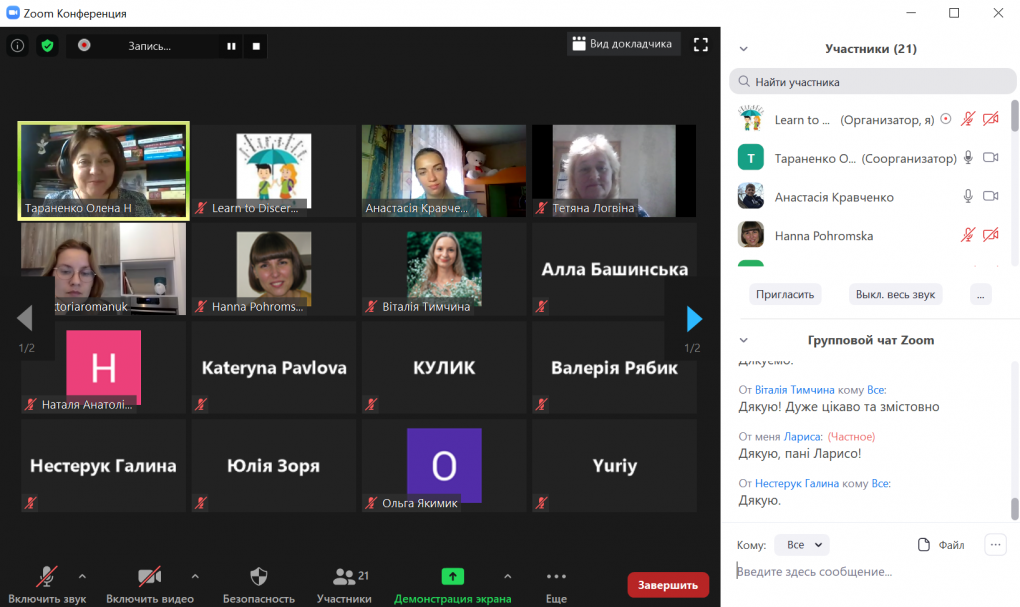
We received so many creative, interesting and bright ideas on integration of media and information literacy in social science and math classes during the experience exchange webinar which was held on June 2, 2020, that you have a full right to envy us for that! Participants shared the opinions, discussed and generated an immensely huge number of ideas on how to build media and information competencies at the lessons of Chemistry, Math, Biology, Computer Science and even PT classes.
But don’t worry if you were absent. We have prepared brief notes for you below:
“Teachers engaged in the project are receiving educational kits and supplies with many options ready for the use, wherein one may choose something or add extra elements,” said Olena Taranenko, capacity building manager for IREX’s Learn to Discern in Education (L2D-Ed) program in Ukraine, “However, we decided to cooperate with the university lecturers and methodology experts in a different way, encouraging creative use of our methodology and applying the fundamental media and information literacy knowledge and skills that we had attained together before.”
Viktoriia Romaniuk, team member of educational kit development, Deputy Head at The Mohyla School of Journalism, Deputy Chief Editor at StopFake, shared her own experience about the needs to address various kinds of experts in fact checking activity: “We are certainly not medical workers, nor chemists, nor physicists, but media contain different news which require a specific expertise, and we cannot give a competent answer. This is why we need to address experts. So, we can play this game with children while learning. One is giving a piece of news and everybody is playing “experts”. In this way, we suggest children being the professionals who should contradict the opinions, carry out an investigation, and, most importantly, explain in terms of one’s expertise whether the information is true or false.” Recommendations from Viktoriia:
Our participants incorporate media and information literacy in their classes:
Anastasiia Kravchenko (Mykolaiv Regional Institute for Continuing Teachers’ Training)
We have already realized the way it works due to the project advice and our own practical skill building. I have prepared seminars on media and information literacy during the re-training courses for Chemistry teachers. We have discussed what it is, why it’s necessary, how one can implement it in education; gone through a lot of practical exercises which improve one’s knowledge of Chemistry and skills of work with information at the same time.”
Tetiana Lohvynova (Bohdan Khmelnytskyi Melitopol State Teachers’ Training University)
“The project encouraged development of different approaches, use of new information technologies, and gamification to foster a creative environment, also when teaching biology. Currently, a teacher’s role in education is transforming. It means, a teacher should set up a creative environment for learners to improve, express their talents and, thus, new approaches are developed. So, organizing such kind of education is a platform for getting better knowledge, carrying out new searches, and realizing new steps.”
Vitaliia Tymchyna (Rivne Regional Institute for Continuing Teachers’ Training)
“We use assessment quite extensively and lean to do it efficiently. To achieve this goal, we work in groups, specify the criteria of peer- and self-assessment, evaluate ourselves and one another, analyze the results, and find out the improvement areas. Everybody gives oneself recommendations which can help one get better knowledge in future and achieve a new professional level. The project methods allowed us to provide interesting activities and exercises for re-training PT and Computer Science teachers, meanwhile innovativeness of those methods enabled us to use them even for remote teaching during the quarantine.”
Project “Learn to Discern (L2D) - Media Literacy Training” is being implemented by International Research & Exchanges Board (IREX) with the support of the U.S. Embassy in Ukraine and the British Embassy Kyiv, in partnership with the Ministry of Education and Science of Ukraine and the Academy of Ukrainian Press.